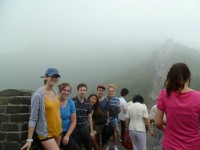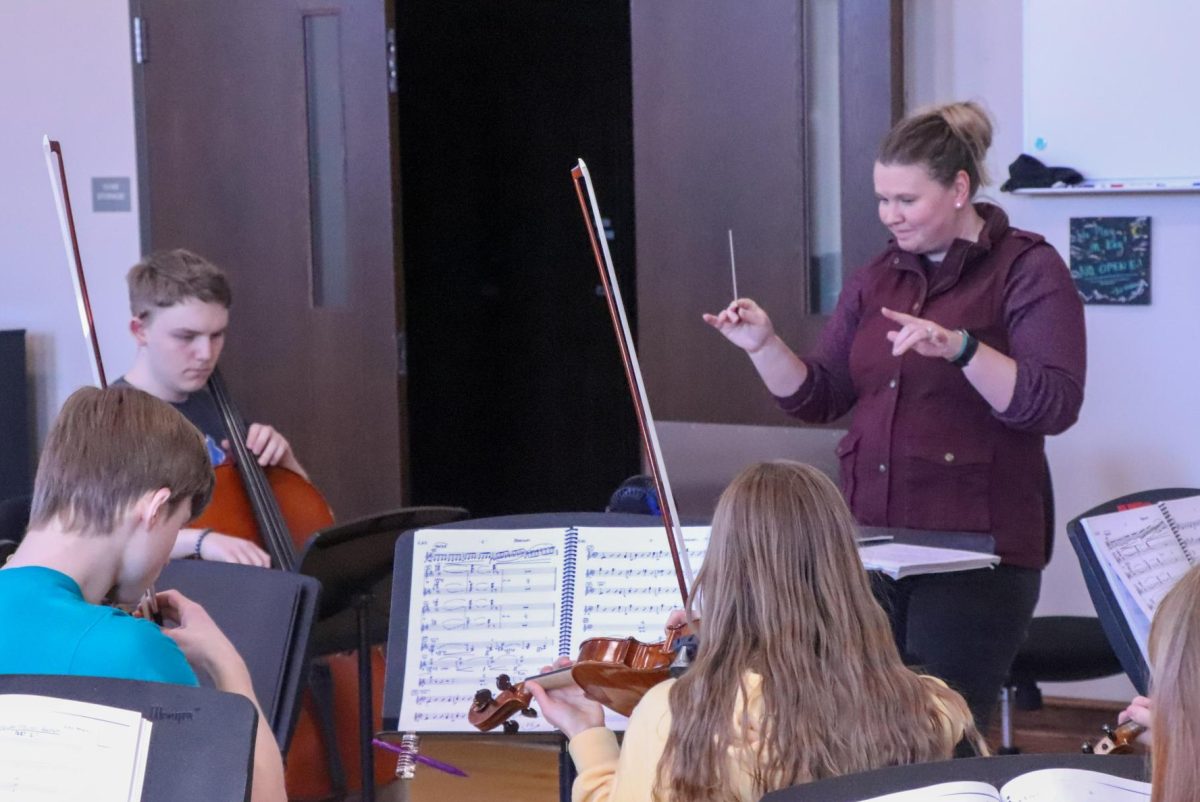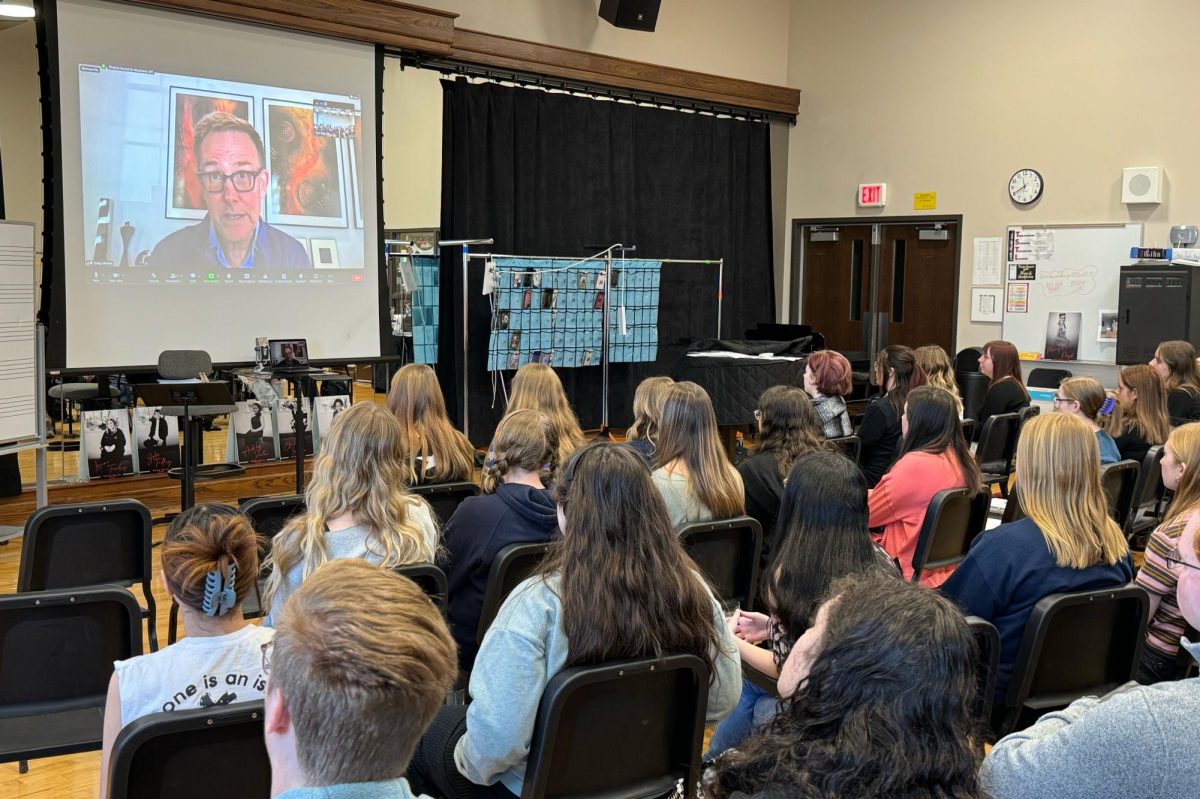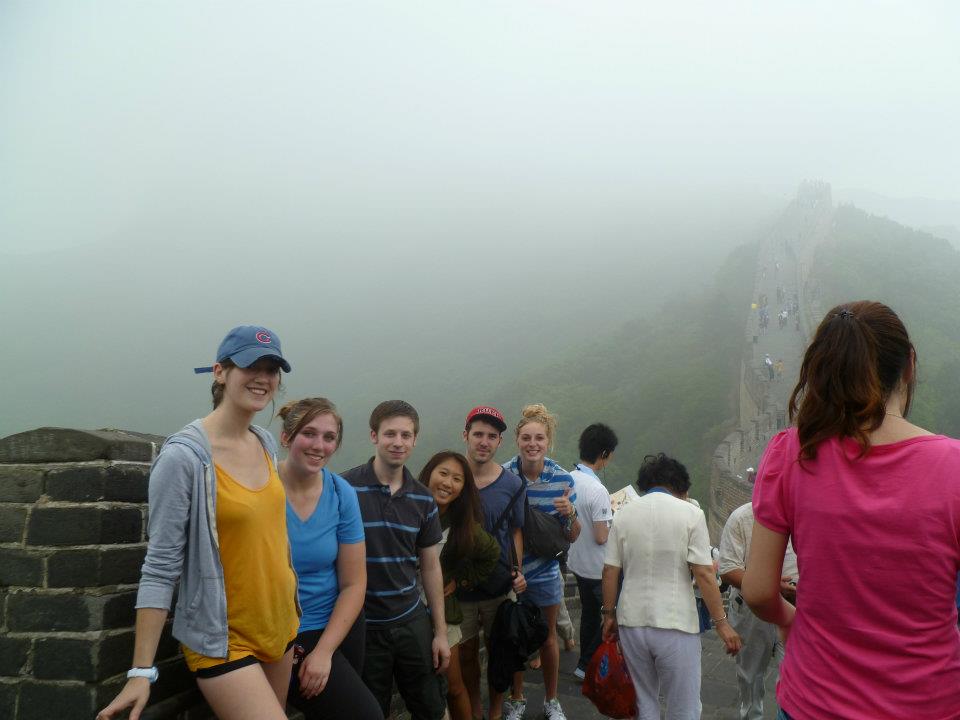The First Days
I spent two months of this summer studying in the city of Tianjin, China. Those two months helped me develop an appreciation not only for Chinese culture, but also for American culture and the similarities and differences between the two.

We first arrived in Beijing, China. The study abroad program that I had chosen had arranged for us to tour the capital city for two days before leaving for Tianjin to study. This was a great way to get used to the thirteen-hour time difference between Iowa and the entire country of China, since we were forced to wake up at certain times, and by the end of the day, we were absolutely exhausted. We climbed the Great Wall, walked around the Summer Palace and checked out the Temple of Heaven.
All of these places were heavily populated with tourists, both Chinese and foreign. Some of the Chinese tourists had never seen white people before, so many of my classmates were asked to take pictures with random strangers.
As the Chinese tourists were shocked to see my white classmates, we all experienced culture shock immediately after stepping off the plane.
Things to get used to:
Smog
The air in any big city, in any country, is pretty bad. But imagine cramming 13 million people (the approximate number of residents in the entire state of Illinois) in a city that only covers 3390 square miles of land (a little larger than the state of Delaware). Add the fact that Tianjin is a huge metropolitan and industrial city, and you get really nasty air. I think we only ever saw the blue sky after it rained.

Toilets
If you find a sitting toilet in public, you’re lucky. If there is toilet paper provided, you’re even luckier. And oh man, if there is soap in the bathroom, the bathroom gods must have been smiling upon you that day. I basically refused to use public restrooms the first week in China. Almost all public restrooms are squatters, meaning that they are essentially just holes-in-the-ground. If you want to wipe, you’ve got to carry around your own tissues/toilet paper. Many toilets also stink reaaaal bad, because there are just so many people using them everyday, and so few people cleaning them. Once, in a train station, I went into the restroom, and there were just holes lined up. No stalls, no walls, no doors, just squatter toilets; I immediately turned around and left.
Food

Okay, so after scaring everyone off with the smog and the toilets, I’m going to talk about the food. Food in China is tasty, exotic, filling and low in calories. Even if you don’t like something, you don’t have to feel bad about it; just buy something else! Food in Tianjin is generally inexpensive. The first time I got breakfast, I spent ¥ 1 RMB; that’s approximately $0.16 USD. Service is fast, but not always friendly, and you never ever have to tip. We ate rice and noodles almost everyday. Sometimes, when we missed home, we would walk to McDonald’s or KFC, just a few blocks down.
During a weekend trip to Beijing, I ate scorpions, snakeskin, and seahorse on the famous Wang Fu Jin.
Tasty scorpions on a stick!
Smells
So, I’ve already mentioned the toilet smells, and the air pollution. Tianjin kind of smells a bit like sewage, but it’s okay, you get used to it.
Population – Most of the “things to get used to” that I mentioned above are related to the population density in Tianjin and most of the rest of China. If you cram a ton of people into a tiny area, it is bound to be a bit dirtier than what we’re used to in America. Another huge difference that we experienced in China is that if you are not aggressive in line, you will not get what you want. In America, we line up and wait for our turn. In China, you have to shove your way through, or you will just be standing there all day.
Traffic
I was scared to cross the street for the first week. We’ll come back to this later.
Bartering – Never ever ever pay full price for something unless it has a price tag on it. Also, don’t speak English if you can help it. The more “foreign” you act, the harder the shopkeepers will try to rip you off.
Classes
Sometimes I forget that I even did any studying in China. I did, of course, attend classes every weekday from 8:00 am to 12:30 pm; this equated to 8 credit hours (4 language, 3 culture, 1 elective) to the University of Iowa. It was so stress-free to be able to study for just one topic. Besides the daily classes, the program arranged for us to have weekly language partners, afternoon culture classes (painting, tai qi, paper cutting, calligraphy, music), cultural excursions, and family dinners.
Extracurricular Activities
I won’t lie; as college students, one of our main priorities was to check out the nightlife. If you’re ever in the Tianjin area, I would highly recommend checking out Helen’s Bar in the evening, then heading out to Sitong Bar to dance the night away. Both places are very international and easily became our favorite hangouts. Helen’s bar serves some of the best Western food in Tianjin and for the best prices. Where most “foreign food” prices are jacked up, a heaping plate of pasta at Helen’s will only cost you ¥25 RMB (about $4 USD). The serving staff and patrons love foreigners, and it’s a great place to practice Chinese with the locals, or meet other foreigners and brush back up on your English.
With a dance floor and a hot live band from the Philippines, it’s easy to see why Sitong is rated one of the top 4 clubs in Tianjin. To be completely honest, much of the Chinese that I learned abroad was at these two places. There is only so much that you can learn from a textbook, and so much more to be learned in day-to-day conversation.
Random Stereotypes From Americans about China:
I learned very quickly that Chinese people are not necessarily bad drivers… It’s just that nobody really cares about traffic laws. I saw, at times, three cars merging into the same lane, cars driving against the flow of traffic, and cars driving on wide sidewalks. Pedestrians do not have the right of way; I think. Oh, and everyone honks, all the time.
Not all Chinese people are super short! The generalization in China is that Northern Chinese people are taller and eat more noodles. Southern Chinese people tend to be shorter and eat more rice. Since most of the Chinese immigrants in the United States tend to be from Southern China, it makes sense that we seem to think that all Chinese (or Asian) people are short.
The people in Tianjin eat really large portions. When I asked how they ate so much, but stayed so little, they pointed out that American food has a lot more “卡路里”, calories.
From Chinese about America:
Many of the Chinese residents were under the impression that America is a very dangerous country. When I asked why, they responded that it seemed scary that the American government allowed people to carry guns and asked if I was ever afraid of getting shot.
None of my taxi drivers believed that I was American! Whenever I tripped up on a word in Chinese, and it became obvious that Chinese isn’t my native language, I’d let them guess what country I was from. Almost everyone guessed Korean. Apparently, I can’t be American, because I’m not Caucasian. I found this terribly amusing, especially when I was obviously speaking English with my tall blonde roommate.
Why you should and can study abroad:
Language Immersion
As I said before, there is only so much that you can learn in a classroom. When you’re in a classroom in America, you may speak that language one hour a day, 5 days a week (for me it’s only 2 days a week), and you don’t retain very much. Being in a country where you constantly have to read, hear, and speak a foreign language makes it so much easier to remember.
Schedule
As a Chemistry Major, I thought that I would never be able to study abroad and complete my degree within four years. The Chemistry course four-year plan is rigid, with very little room for deviation, but I was able to fit this trip in for the summer. No matter what your major, if you’re interested in studying abroad, you and your advisor can find a way to make it work.
Money
Many students are concerned that they cannot afford to study abroad. This is a completely legitimate concern, as many programs cost several thousands of dollars, not including airfare, food, and souvenirs and outings while abroad. What many students may not be aware of is the amount of scholarship money that is available to them, especially for students studying Chinese. Students who are interested in studying abroad in China are eligible for so many scholarships, because Chinese is a critical need foreign language; this means that there is an increasing need for speakers of these (currently 13) languages, but there are very few people in the United States who can speak or are studying these languages. One of the scholarship programs that sponsored my trip to China is the Benjamin A. Gilman International Scholarship. Students who apply for the Gilman Scholarship are eligible to receive up to $5000, and critical need language students are eligible to receive up to $3000 on top of that, coming to a total of $8000. I was lucky enough to receive money from the Gilman Scholarship, as well as funding from the Asian language department at the University of Iowa. With this type of support, and such low living expenses (we were given weekly food stipends and I spent only about $5 USD on food each day), my trip to China was almost free.
Study Abroad!
Seriously, go do it! It’s an amazing experience that you will never forget. In fact, I’m already starting to plan for my next study abroad… China again? Australia? Thailand? Who knows!? Go have an adventure!












































